Seat belts
Seat belts
Always wear your seat belt when travelling in your vehicle. You must also comply with
the legislation of the particular country you are in.
Before starting, first adjust your driving position, then ask all occupants to adjust
their seat belts to ensure optimum protection.
Adjusting your driving position
- Sit well back in your seat (having removed your coat or jacket, etc.). This is essential to ensure that your back is positioned correctly;
- adjust the distance between the seat and the pedals. Your seat should be as far back as possible while still allowing you to fully depress the pedals. The seatback should be adjusted so that your arms are slightly bent when you hold the steering wheel;
- adjust the position of your headrest. For maximum safety, your head must be as close as possible to the headrest;
- adjust the height of the seat. This adjustment allows you to select the seat position which offers you the best possible view;
- adjust the position of the steering wheel.
Tip
Make sure that the rear bench seat is locked in position correctly so that the rear
seat belts will operate correctly REAR BENCH SEAT: FUNCTIONS.
WARNING
Incorrectly adjusted or twisted seat belts may cause injuries in the event of an accident.
Use one seat belt per person, whether child or adult.
Even pregnant women should wear a seat belt. In this case, ensure that the lap belt
is not exerting too much pressure on the abdomen, but do not allow any slack.
Adjusting the seat belts
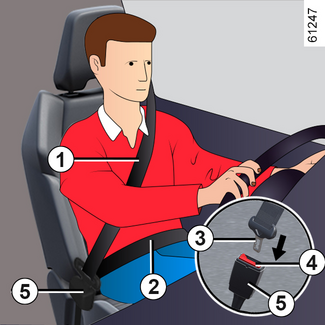
To ensure the correct adjustment and positioning of the seat belts on all seats:
- adjust the seats (seat position and seatback angle, if available);
- sit with your back firmly against the seatback;
- move the shoulder strap 1 as close as possible to the base of the neck without it actually resting against it (if necessary, adjust the height of the seat belt if possible) and make sure that the shoulder strap 1 is in contact with the shoulder;
- position the lap belt 2 so that it lies flat on the thighs and against the pelvis.
The seat belt must be worn as close to the body as possible. e.g. avoid wearing heavy
clothing, keeping bulky objects under the belts, etc.
Locking
Unwind the belt slowly and smoothly and ensure that the buckle 3 locks into the catch 5 (check that it is locked by pulling on the buckle 3).
If the belt jams, allow it to return slightly before attempting to unwind it again.
If your seat belt is completely jammed, pull slowly, but firmly, so that just over
3 cm unwinds. Allow it to return slightly before attempting to unwind it again.
If there is still a problem, contact an approved dealer.
Unlocking
Press the button 4 and the seat belt will be rewound by the inertia reel. Guide the belt.
Warnings
- Driver’s seat belt reminder and, depending on the vehicle, front passenger seat belt reminder
With the doors closed, the  warning light appears on the central display when the vehicle ignition is switched
on if the driver's or front passenger's seat belt(s) (if this seat is occupied) are
not fastened. It is accompanied by the 6 graphic.
warning light appears on the central display when the vehicle ignition is switched
on if the driver's or front passenger's seat belt(s) (if this seat is occupied) are
not fastened. It is accompanied by the 6 graphic.
Depending on the vehicle, if the seat is occupied and one of these seat belts is not
fastened or becomes unfastened while the vehicle is moving at a speed over approximately
12 mph (20 km/h), the  warning light flashes and a beep sounds for approximately 120 seconds.
warning light flashes and a beep sounds for approximately 120 seconds.
Note: an object placed on the passenger seat may activate the warning light in some cases,
depending on the vehicle.
Rear seat belt reminder (depending on the vehicle)
The 6 graphic is displayed on the instrument panel when the ignition is switched on. This
informs the driver of the fastening status of each of the rear seat belts every time:
- the ignition is switched on;
- a door is opened;
- a rear seat belt is fasted or unfastened.
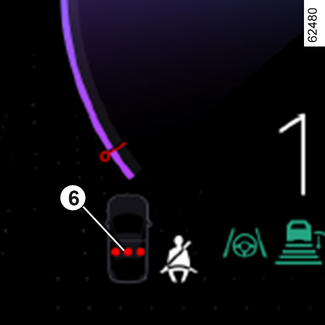
Understanding the graphic 6:
- symbol in green: seat belt fastened;
- symbol in red: the seat is occupied and the seat belt is not fastened;
- symbol in grey: seat not occupied.
The  warning light on the central display also appears when the ignition is switched on,
if a rear seat is occupied and the seat belt is not fastened.
warning light on the central display also appears when the ignition is switched on,
if a rear seat is occupied and the seat belt is not fastened.
When the vehicle speed is less than approximately 12 mph (20 km/h), the warning light
 on the central display appears if a rear seat is occupied and the seat belt is not
fastened.
on the central display appears if a rear seat is occupied and the seat belt is not
fastened.
It is accompanied by the 6 graphic which appears for approximately 60 seconds each time one of the rear seat
belts is fastened or unfastened.
When the vehicle speed exceeds approximately 12 mph (20 km/h), if one of the rear
seat belts is or becomes unfastened during the journey:
- the
warning light flashes on the central display;
and
- a beep sound for approximately 120 seconds;
and
- the 6 graphic is displayed for approximately 180 seconds and the symbol for the seat concerned changes to red.
Always make sure that the rear passengers are properly fastened and that the number
of fastened seat belts indicated corresponds to the number of rear seats occupied.
Note: in some cases the alerts may be activated if an object is placed on one of the rear
seats, depending on the vehicle.
Adjusting the height of the front seat belts
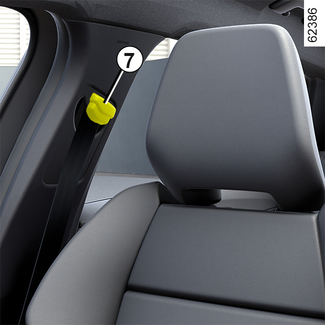
Press the button 7 to adjust the seat belt height, so that the shoulder strap is worn as shown previously.
Press the button 7 and raise or lower the seat belt. Make sure that the seat belt is locked in position
correctly after you have adjusted it.
Rear side seat belts 8
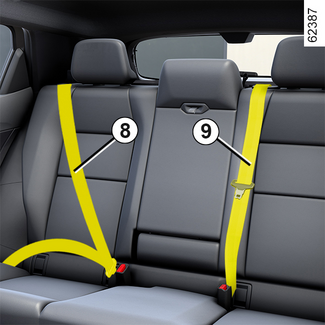
The belts are fastened, unfastened and adjusted in the same way as the front belts.
WARNING
Check that the rear seat belts are positioned and operating correctly each time the
rear bench seat is moved.
Rear centre seat belt 9
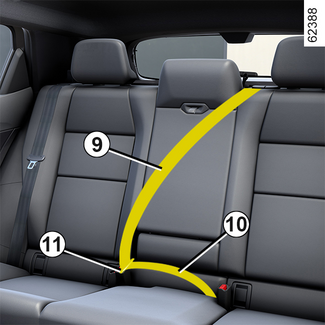
Slowly unwind the belt 9.
Fasten the buckle 10 into the red catch unit 11.
Warnings
The following information applies to the vehicle’s front and rear seat belts.
WARNING
- No modification must be made to the originally-fitted restraint system components (seat belts, seats and their mountings). For special operations (e.g. fitting child seats) please contact an approved dealer.
- Do not use devices which give any slack in the belts (e.g. clothes pegs, clips, etc.), as a seat belt which is worn too loosely risks causing injury in the event of an accident.
- Never wear the shoulder strap under your arm or behind your back.
- Never use the same belt for more than one person and never hold a baby or child on your lap with your seat belt around them.
- The belt should never be twisted.
- Following an accident, have the seat belts checked and replaced if necessary. Always replace your seat belts as soon as they show any signs of wear.
- When the rear bench seat is being put back, make sure that the seat belts and buckles are correctly positioned so that they can be used properly.
- Make sure that the seat belt buckle is inserted into the appropriate catch.
- Ensure that no objects are placed in the area around the seat belt catch as they could prevent it from being properly secured.
- Make sure the seat belt catch is properly positioned (it should not be hidden away, crushed or flattened by people or objects).